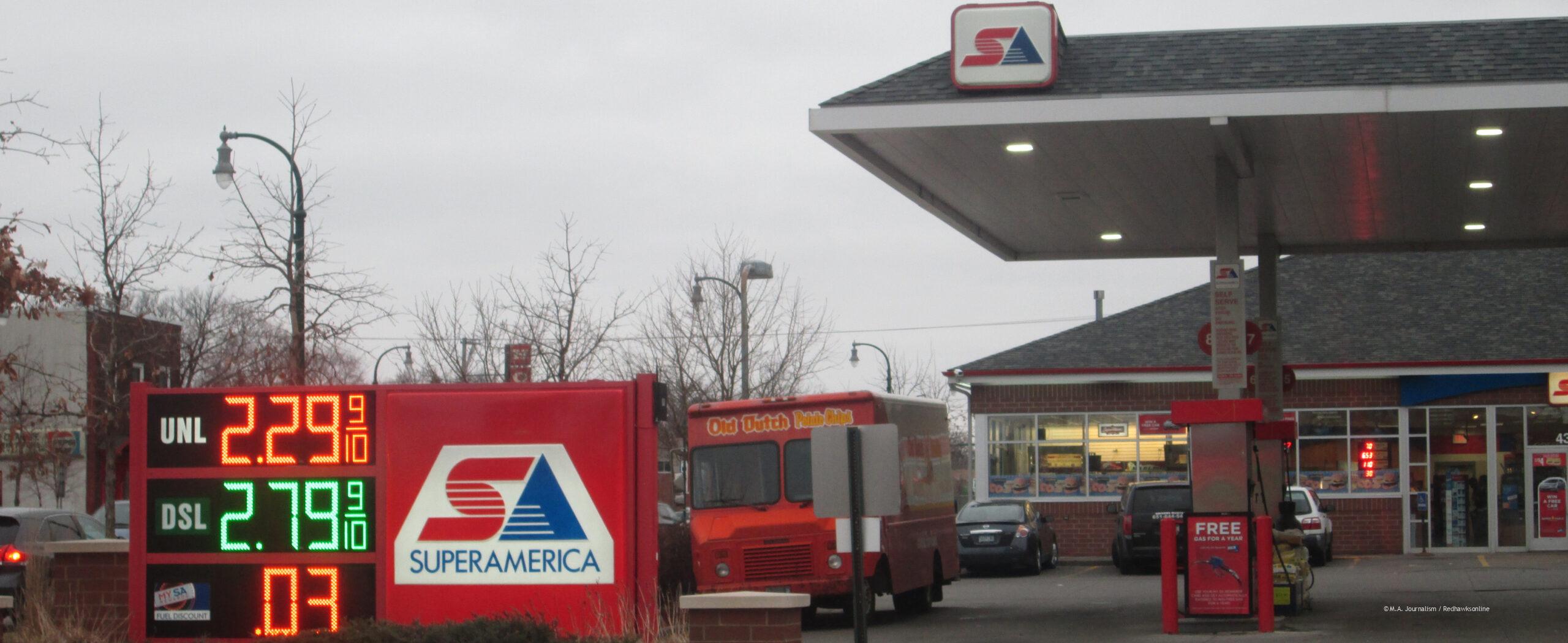Consumers are used to fluctuating gas prices and welcome the recent drop but drivers should still be wary of the economy and its constant changing climate
Driving down Lake Street on the way to school or even going to fill up at Super America just a few blocks from school, one might notice that the price of your run-of-the-mill regular unleaded was under two dollars per gallon.
Just last year, at the beginning of November, it would have cost you more than three dollars to get a gallon of gas, according to the U.S. Energy Information Administration (EIA). And going back even further, gas was at $4.32 per gallon in May 2013, $3.50 per gallon in May 2014, and it was down to $1.91 per gallon in certain places during the month of January.
There are a number of factors that go into the rise and fall of commodity prices like gas. As any good economist will tell you, supply and demand are big factors in any sort of price change.
“Over Christmas break, I had dinner with two good friends, two old college roommates, and this is interesting,” said economics teacher David Hoffner. “One’s a financial analyst who said it’s purely supply and demand. He said Saudi Arabia [and the rest of the Organization of Petroleum Exporting Countries (OPEC)] has not turned off the tap. They’ve increased the supply, and that’s keeping the price down.”
“The guy across the table, who’s a civil engineer, said it’s not just supply and demand, it’s geopolitics,” continued Hoffner. “It’s the Saudis trying to harm Iran and their alliance with Russia, crumbling their economy, the ripple effect of anytime gas is below a hundred dollars a blue barrel. A lot of stuff isn’t viable.” How do we reconcile what has happened in the market, especially with gas prices, so far?
In terms of supply and demand, the first friend’s argument, Saudi Arabia has increased the supply, but what about demand?
Europe’s currency isn’t doing well right now, leading to lower spending across the board. Most of the main cities in Europe have effective public transportation, Europeans are spending far less at the pump, which means the demand is down. Their recession affects America’s overall economy, so it makes sense that their behavior would affect the petroleum industry, as well.
With supply from Saudi Arabia up and demand from Europe down, gas prices fell fast through December.
Now, though, they seem to have leveled out, right around two and a half dollars per gallon in Minnesota. Some people are driving more, now that they can go further for the same amount of money, but some people are just using the fact that prices are down to save a few dollars.
“I don’t think it has affected the way I drive,” said junior Josh Radtke, “but I think I’m just more wary, now, of when gas prices go back up. I’ll definitely be driving more efficiently in the future.”
But supply and demand aren’t the only factors, or at least not the only theories, contributing to the drop in gas prices.
“I probably tend more toward the supply and demand argument,” said Hoffner, “but I do think there’s a geopolitical element to it for sure.”
Because gas isn’t just gas. Most of our interaction with gas every day comes in the form of other products made from the same thing gas is: crude oil.
“When I teach economics,” said Hoffner, “gas is one of those few things that half of your encounters with gas aren’t even in cars. Like plastic desks and all this other stuff, so one of the factors is production getting a lot cheaper that should lead to lower costs for everything. But it’s also going to scare people into a deflationary [mindset], like, ‘if this goes on too long,’ there’s going to be that worry about a decreasing price level.”
Returning to price levels, though, there has been a more than 50 percent drop in gas prices from May 2013 to now. In May 2013, gas prices topped out at $4.34 per gallon (EIA).
“When people say this about [it], ‘Oh the President’s lowering gas prices to get reelected,” said Hoffner. “If you really think that’s possible that one person could make such a move, then you should take everything you have and short the market and retire. The fact that people don’t do that means that there is so much more uncertainty to this stuff than we’d like to believe.”
Whether someone buys their own gas or their parents pay for it, they’re saving money at the pump. But Europe will come back, and demand will go up again. So as the demand increases, the prices will follow.
But with prices coming down, there is less of an emphasis on the environmental impact of driving. People want the earth to keep spinning, but ultimately, most people want to save money more. Just because people can drive more now, it doesn’t mean that they should.

